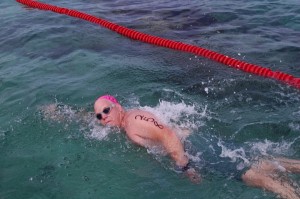 A couple paragraphs out of the talk I’m giving tonight at U Conn Avery Point, as part of the Coastal Perspectives lectures series —
A couple paragraphs out of the talk I’m giving tonight at U Conn Avery Point, as part of the Coastal Perspectives lectures series —
It happens in three stages. First, immersion. The sudden shock of getting into the water. It’s a phase change, really, a transition from being in the air, which, depending on location and temperature, contains quite a bit of water vapor, into heavier, viscous liquid water. You’re out, then you’re in. Nothing quite like it. After that, buoyancy. Our bodies need just a little help to pop up to the surface. We can relax and float, for a little while. This is the hopeful moment. Last, exertion. Moving our arms and legs in practiced patterns, we stay at the surface, even move around from place to place. Nothing lasts forever, but there is short-term stability and pleasure, for a while.
And a little later —
Swimming matters because humans can learn how to do it, even do it very well, but it’s always dangerous. Eventually you need to get out of deep water. A minor character in Conrad’s Lord Jim emphasizes that swimming is, at bottom, futile:
Very funny this terrible thing is. A man that is born falls into a dream like a man who falls into the sea. If he tries to climb out into the air as inexperienced people endeavor to do, he drowns….No! I tell you! The way is to the destructive element submit yourself, and with the exertions of your hands and feet in the water make the deep, deep, sea keep you up.
The “exertions of your hands and feet” provide a bleak a vision of human insufficiency, but it puts off drowning. Conrad’s character is a native German speaker, and his jumbled syntax parallels the awkwardness of human swimming itself. As Conrad knows, as all swimmers and sailors know, there is no long-term survival plan for swimmers in the deep ocean. But the immersive experience, being in the “destructive element,” is precisely what poetry helps us understand. Poetry is good at imagining radical change, and good at making readers enjoy it. Literary criticism has a name for this technique: the poetic sublime, which I’ll explain shortly. My focus tonight is on the way that poetic forms provide models for enduring inside a hostile environment. The world after global warming is not the future – it’s the present – and making sense of that present requires a poetic, oceanic imagination.
What, three months or more after you telling me about this site I finally check it out? Good to see you looking strong in the swimming pic, and I’m sitting here thinking how we can learn to swim, read, and write.
Good to see you, Bill! The pic is from my 10km open water race in Bermuda this past October — http://stevementz.com/?p=1302. Swimming, reading, & writing sound like good things to me!Q=